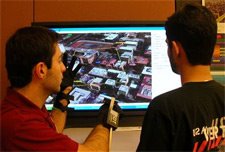Russell Shaw takes his obsession with Apple’s “iPod” trademark addiction to ZDNet in this expose of Apple’s latest USPTO encounters and recent C&D letters to the likes of Podcast Ready for daring to use the “P” word in his article: “EXCLUSIVE: Apple Trademark Office docs point to REAL reasons for” Podcast” controversy“
we have Apple, maker of the iPod, trying to get right with the Trademark office about achieving formal Trademark and related mark protections for iPod AND its sought-after IPODCAST applications.
 Not only would this restrict ANY individual or company from using the term “podcast” or “podcasting,” it would also put a lock on, for example “iPod socks,” not to mention T-shirts declaring “iPods suck.”
Not only would this restrict ANY individual or company from using the term “podcast” or “podcasting,” it would also put a lock on, for example “iPod socks,” not to mention T-shirts declaring “iPods suck.”
Dave Winer proposes a start-up idea for a “real podcast player” that would put Apple’s DRM to shame.
AOL/Netscape’s Jason Calcanis is rightfully dismayed: “Anyway, Apple didn’t come up with the concept of Podcasting but they have benefited from it immensely.”
Former MSFT evangelizer Robert Scoble wonders if team Apfel will up and sue his new employer, Podtech.net
Todd Baur at the Apple Blog asks if Apple is going to sue the framers of the Constitution for proposing the First Amendment: “When the iPod was introduced, no one would have associated pod with an MP3 player. Now that the little guy has become the king, there is no argument that the term is almost synonymous with music players.”

 In a potentially groundbreaking move for the music / entertainment industry, Warner Music Group is set to announce an deal to distribute copyrighted content through the video upload/download/streaming megahub,
In a potentially groundbreaking move for the music / entertainment industry, Warner Music Group is set to announce an deal to distribute copyrighted content through the video upload/download/streaming megahub, 
